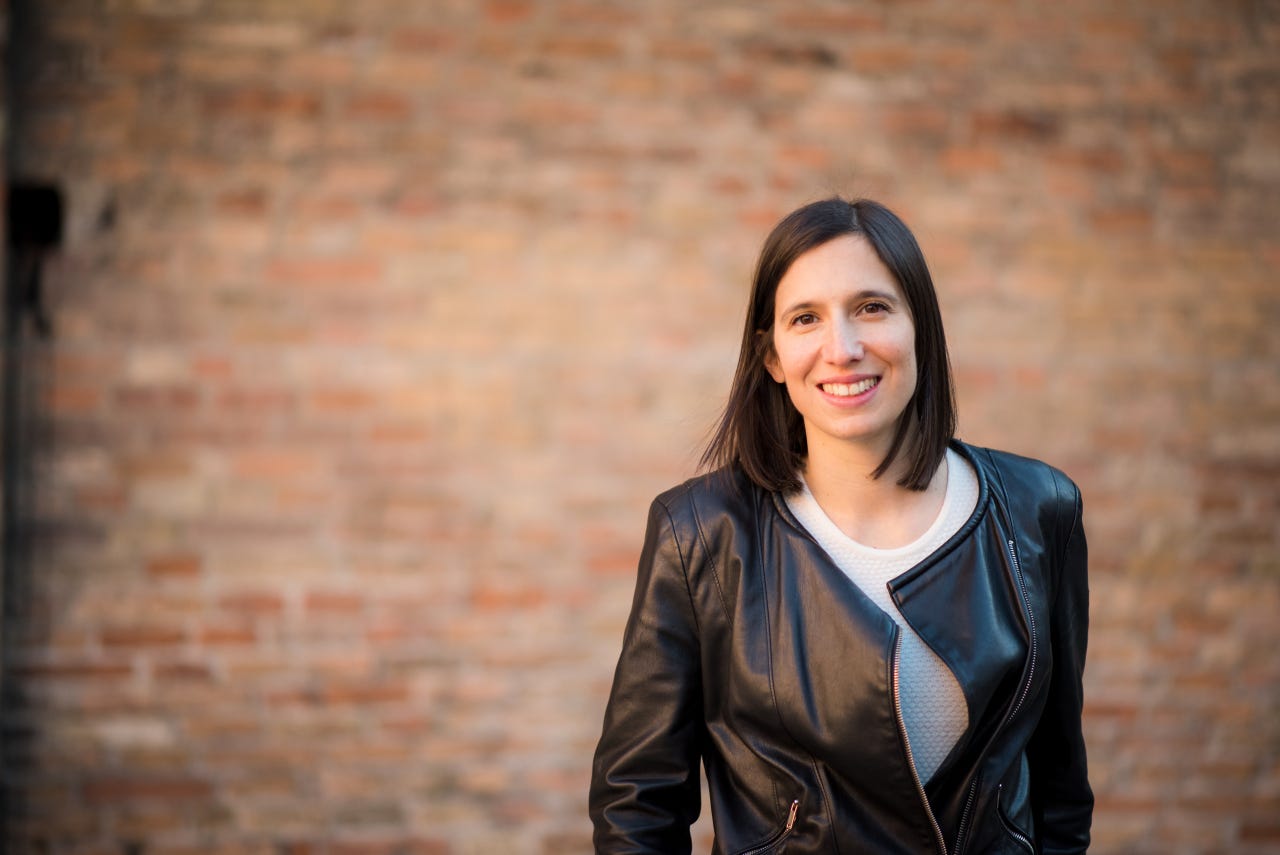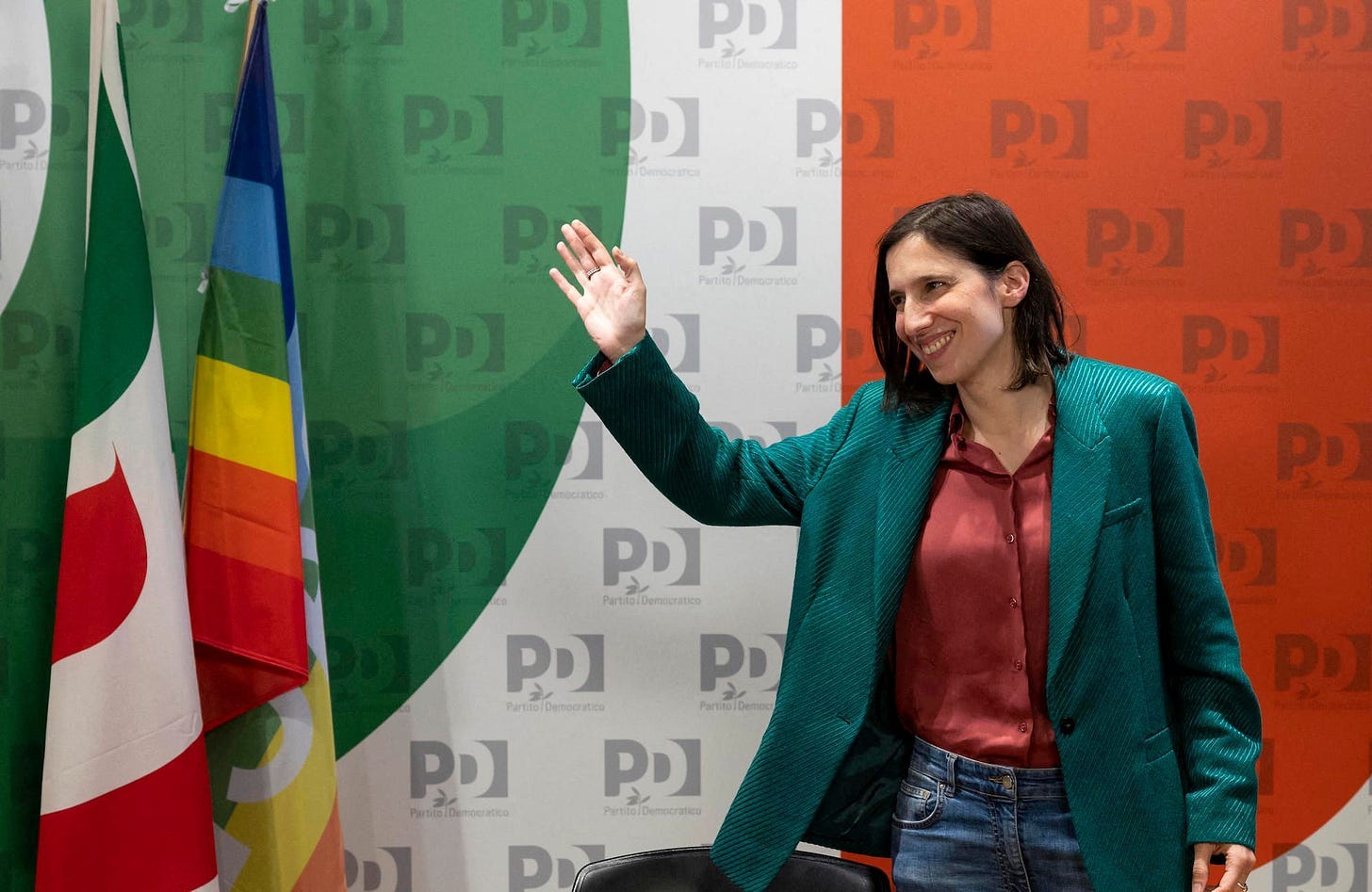Elly Schlein and the return of the Italian left?
PD voters roll the dice
This weekend members of Italy’s centre-left party, the Partito Democratico, came out in their thousands to vote in a much-anticipated leadership contest to decide who would be next to take the helm of the ailing party. Over a million individuals cast a ballot in total; a little down on previous contests but frankly a far higher turnout than expected. More significantly, against almost all predictions, members, and the interested public, ended up backing Elly Schlein, a 37-year old feminist to be their leader. The ‘radical’ outsider won 53,8% of the vote in the end, just surpassing her closest rival Stefano Bonaccini – who won 46,2% – to the top spot. Now, Schlein will take on the considerable task of rebuilding Italy’s traditionally largest opposition force; of redefining what the left is in this country and what vision it can offer to beat Georgia Meloni’s current coalition. With this quick Q&A I want to offer a quick lowdown on what Schlein’s political project (might) look like, and what kind of vision we can expect to see in the coming months.
What’s Schlein’s story?
Elly Schlein (1985) is the child of Melvin Schlein, an American Jewish academic, and Maria Paola Viviani Schlein, an Italian lawyer. She grew up in a middle-class Italian-speaking area of Switzerland, speaks three languages and has triple nationality (Italy, Switzerland and U.S.A). Professionally, Schlein began her political career in earnest working on Barack Obama's election and re-election campaigns, during which time she specialized in (succesful) grassroots organizing. Between 2014 and 2019, after joining and leaving the PD in protest against Matteo Renzi’s ‘neoliberal turn’, she served as an independent MEP. More recently, she’s been involved in a PD-associated local government in Emilia Romagna. On a personal level she enjoys computer games and cinema, plays guitar, and considers herself a “nerd.”
What are her main ideas?
Schlein’s politics are extremely focused. Unlike her PD rivals, who have, for years, been offering-up various shades of neoliberalism, the new leader is explicitly committed to furthering a ‘green socialist’ programme starting with two flagship policies 1) promoting and introducing a minimum wage 2) funding green investment and healthcare by higher taxes on the rich.
Anything else?
Yes. Beyond the headline news, Schlein is concerned with a (seemingly earnest) ethical mission to further refugee and minority rights by ending deportations, fighting for better migration policy at EU level and providing automatic citizenship for children born in Italy to foreign parents. She is also focused on tackling poor and criminal urban planning by, for example, supporting sustainable urban development rooted in municipal experiences (e.g. improving soil health, air quality etc).
How has the left responded to her victory?
Schlein’s ascension has been a bit of a shock, both for neoliberals and for old school communist nostalgists. If you give Schlein a google the chances are you’ll read that she’s a representative of the ‘intersectional’ or ‘woke’ left; which is usually a form of criticism; implying she is only tied only to social movements, social media, youth and cities, green activism and totally removed from workers and the working class.
This is a pretty superficial take if you ask me. Yes, Schlein has long been concerned with the push for LGBTQI+ rights. She identifies as bisexual, her partner is female, and she is, for personal and political reasons, concerned with social struggles. At the same time, there should be no denying that Schlein’s policies are about and for workers. Her push for a minimum wage, her proposed policy to end unpaid internships, to introduce limits on short term contracts, to force employers to take-on staff and work with unions to “give to the poor that the government doesn’t want to see” can hardly be disregarded as part of a woke identity politics agenda. On the contrary: she’s trying, like few others before her, to embed contemporary social struggles (those that acknowledge intimate life, and individual experience and identity) into a larger class politics.
What does Schlein’s victory within the PD mean for the Italian left as a whole?
On paper Schlein’s victory implies that from hereon on out the PD will make a definitive split with neoliberalism to try something genuinely new. In practical terms this should mean that the party will give up trying to appease Renzi, Calenda and the various ‘Third Pole’ party agents, and instead work on building a close alliance with the anti-establishment Five Star Movement (M5S). Schlein, a competent, charismatic, talented, seemingly principled, certainly rational woman is the most exciting leader of a major leftist party for a very long time indeed. Giuseppe Conte, her counterpart in the M5S, must now avoid masculine jealousies and rise to the occasion in a spirit of productive cooperation.
So what’s the catch?
I know, I know, this all sounds a bit too good to be true. And it is, in a sense. Schlein is by no means a perfect opposition candidate, and her route to power looks tricky. She is - for example - opposed to nuclear energy; a stance that will chime OK with many M5S voters but which is also likely to alienate others on the PD’s centre-left. She has also kept an awkward silence vis-a-vis Ukraine. Yes, she clearly opposes Putin’s imperialist aggression, but where does she stand on NATO? Or, more awkwardly still, on sending arms to Ukraine? The answers to these questions are just not clear yet and could prove divisive. Finally, Schlein defines herself as a European federalist: by which she means reinventing the EU to be more democratic, pluralist, socially just and ecological. This sounds great to me, sure, but there are many on the Italian left that have given up on such a vision, who believe the EU to be unreformable and who may, based on previous experiences, fail to support Schlein when it’s needed most.
What’s your – i.e. my – prognosis?
Honestly? I’m reluctant to offer any definitive takes. The short answer, for now, and for what it’s worth, is… basically… just… good? With a caveat: this is no time to rush. Meloni is still enjoying an extended honeymoon period, and she’ll be stable for a few months yet. Nevertheless, I can’t help thinking that, precisely for this reason, any effort to break through the PD sclerosis is welcome right now. I don’t support the PD. I’ve long considered it an outmoded, overly hierarchal, bureaucratic organ incapable of delivering real change. I still feel that way. Nevertheless, to me, the future of the left also means something like “social movements working with civil society working with unions working with parties working with European forces”; it means nationalists and federalists getting around the same table; and it means advocates of specific social-identarian issues framing their arguments, in new, innovative ways, in terms of class politics. Schlein’s own fate, and the fate of the PD, are one thing. But sneering at the new leader gets us nowhere. The PD’s two future priorities - tackling poverty and inequality while addressing the climate emergency - are a step in the right direction and, to my mind, provide excellent bases for progressives of all stripes to rally around.
About Me
My name is Jamie Mackay (@JacMackay) and I’m an author, editor and translator based in Florence. I’ve been writing about Italy for a decade for international media including The Guardian, The Economist, Frieze, and Art Review. I launched ‘The Week in Italy’ to share a more direct and regular overview of the debates and dilemmas, innovations and crises that sometimes pass under the radar of our overcrowded news feeds.
If you enjoyed this newsletter I hope you’ll consider becoming a supporter for EUR 5.00 per month (the price of a weekly catch-up over an espresso). Alternatively, if you’d like to send a one-off something, you can do so via PayPal using this link. No worries if you can’t chip-in or don’t feel like doing so, but please do consider forwarding this to a friend or two. It’s a big help!


